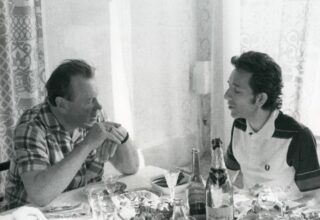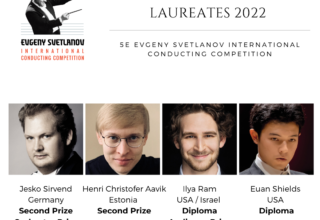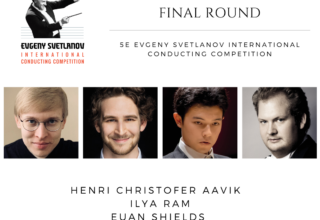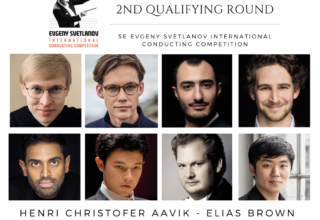On the 60th birthday of the conductor Evgeny Svetlanov
Irina Strajenkova, 19 August 1988
A totally committed artist
“Perestroika” has become the most popular word in the Soviet Union, and one could practically associate it with Evgeny Svetlanov, one of the country’s leading conductors and principal conductor of the USSR State Symphony Orchestra, which has for many years been acclaimed around the world. Why, “perestroika”? Because this artist has always lived and continues to live in the name of boldness and of freedom of expression, vital elements in today’s world. “He is a man with his own opinion about the world and about art, and who defends it confidently,” wrote Rodio Shchedrin during the so-called “years of stagnation”, when the maestro’s only weapon was music. However, today, Svetlanov has fully developed his talent as a journalist, having fired the reader’s imagination with his vehemence and passion on more than one occasion.
It takes great strength of character to dare, on the eve of the premiere of a long-awaited opera (The Golden Cockerel by Rimsky-Korsakov), to describe in a periodical like the Literaturnaya Gazeta all the problems that interfere with normal working conditions at the Bolshoi. The musician had to negotiate with the Minister of Culture, with the management of the Bolshoi and many government officials. And all this, I repeat, on the eve of the premiere… He is always like that. Passionate, utterly dedicated and committed in everything he does. Whatever his activity, be it conducting or musical composition, piano playing or journalism, and even social work, this man never acts in half-measures.
No one has ever “trained” him to organise an educational cycle of concerts for youth. However, with “All Tchaikovsky’s symphonies”, a series broadcast on state television (an extraordinary performance of the six works), Svetlanov demonstrated his talent as an astoundingly gifted, successful television host. His programmes on symphonic music became a sort of very popular series, so popular that viewers dropped everything to rush to their televisions and watch.
His brilliant conducting technique, his precise sense of style, the gift of making the orchestra “sing” as if every musician were playing an Amati, combined with the ability to embellish the slightest detail in composition, understandably held immense appeal for musicians. For them, playing with Svetlanov was always a major event. That is why at the end of a concert, none of the members of the orchestra was in a hurry to leave. They would have long talks with their conductor afterwards, hoping to prolong that moment of spiritual fulfilment.
Evgeny Svetlanov is what could be called a born conductor. However, this gift of nature is founded on huge personal effort. That is why, in Bonn during the Beethoven celebration, the newspapers reported that “the Russians do not settle for merely matching their Viennese and West-Berlin colleagues in their performance of Beethoven, but actually surpass them”. That is why Japanese critics, in comparing Svetlanov to Bernstein and Markevich, preferred the Soviet conductor. That is why the Milanese press claimed that Svetlanov’s orchestra offers the best “performance of Tchaikovsky’s symphonies”. It is simply the fruit of relentless dedication of which Svetlanov holds the secret.
To celebrate the 50th anniversary of his orchestra, Svetlanov prepared a cycle of concerts. This cycle was designed in Svetlanov’s characteristic style: as artistic director and principal conductor of what is now considered to be the “country’s leading orchestra”, he paid tribute to all of his predecessors at each of these concerts. His entire life has been dedicated to the memory and respect of traditions that he fully personifies.
It is in his blood, which he was lucky enough to inherit from his parents, who were singers at the Bolshoi, as well as his teachers, the composer Yuri Shaporin and the conductor Alexander Gauk. He created his own universe through his existence, entirely devoted to art, in total honesty and candidness.
In twenty years as conductor of the State Orchestra, Evgeny Svetlanov offered the public an extremely varied, interesting repertoire, which also illustrates his personal views and his subjective passions. “There is so much good music that several lives would not be enough to play and listen to everything,” Svetlanov said, “and the more you work, the more you see you have to do.”
But in this boundless ocean of music, the conductor had clearly charted his route. As a student in the early stages of his career, when asked by Gauk what had driven him to become a conductor, Svetlanov answered, “A firm intention to revive works that have unjustly fallen into oblivion, starting with Russian classical music”. He in fact became one of the fervent promoters of Russian classical music both in the Soviet Union and abroad. He also created the “Anthology of Russian Music” released on vinyl record and is recognised as the reference for a number of works. “A real artist,” Svetlanov says, “is like a tree whose fruit become a heritage: the more flavours they have, the more they nourish the world. This fruit can be served in many countries and to many peoples, but we mustn’t forget from what tree it came and what land nourished its roots with its strength.”
Have you ever experienced the feeling of failure? When Svetlanov was once asked this question, he replied clearly, “Very often. It is not exactly personal failure, but rather the impression that I could have played better. A feeling of dissatisfaction and bitterness stays with me for a long time, which, I must say, is a stimulus in my work.”
Svetlanov is also a serious and passionate fisherman. His will to excel, like in music, pushes him to row dozens of kilometres (he is no fan of motorboats!) and dedicate his free time to this hobby that is so closely tied to nature. That is why Svetlanov and his wife Nina will never be seen on the overcrowded beaches of fashionable seaside resorts. They spend their holidays in the middle of nowhere, on lakesides in Karelia, in northern Russia, where practical, everyday problems do not disturb this couple, which is fully accustomed to international comfort. In Karelia, they live without a telephone or car: pure air, smooth, vast watery expanses, unspoiled forests and a solitary encounter with nature are a perfect setting for Svetlanov and his music brought from Moscow…
His favourite contemporary writers? Their names reveal his tastes and his interests: Aitmatov, Rasputin, Astafiev… Music today, a recent work by Svetlanov in which deep reflections on nature and the artistic calling are followed by spontaneous reactions from his impassioned heart, offers another angle to the portrait of this artist.
Next September, Evgeny Svetlanov will be sixty. Again, we will find him as he always is, never doing anything in half-measures, “no favours for oneself or the orchestra”. The audience must patiently await the maestro’s next feat. Neither the fulsome praise of international critics nor honorary titles and other prizes, such as the “Hero of Socialist Labour”, the Lenin Prize, the USSR People’s Artist Prize, will change him. His thirst for creation and his eternal aspiration for perfection forever remain intact.




